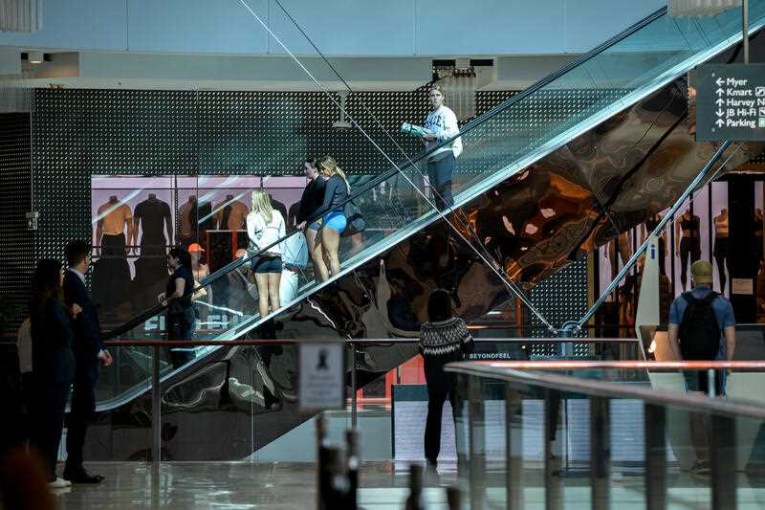Volodymyr Zelensky has warned Russian aggression poses a real threat to countries like Australia during an historic address to the Australian parliament, asking for more support.
Ukraine’s president received a standing ovation from parliamentarians for his speech after which Scott Morrison and Anthony Albanese slammed Vladimir Putin and his invasion.
It comes as the Russian president has been accused of “blackmail” over his latest move threatening to cut off gas supplies to “unfriendly” foreign nations (more below).
Mr Zelensky said Russia needed to pay “the highest price” for its invasion of Ukraine as he requested further access to Australian military vehicles, such as the Bushmaster.
He warned that Australia’s vast distance from the conflict in eastern Europe did not mean it was safe.
“That is the nature of evil — it can instantly cross any distance, any barriers, destroy lives,” he said.
“Unpunished evil comes back with inspiration and a feeling of almightiness.”

Parliamentarians and the gallery offer a standing ovation. Photo: AAP
Mr Zelensky said the invasion of his country wouldn’t have happened if Russia was held accountable for the shooting down of MH17 in 2014.
“We have to correct some horrible mistakes and correct them now,” he said.
“We need new sanctions against Russia until they stop blackmailing other countries with their nuclear missiles. They have to pay the highest price.”
Prime Minister Scott Morrison responded by announcing a further $25 million of defensive military equipment for Ukraine and branded Russian President Vladimir Putin a war criminal.
“Ukraine and Australia are separated by half the earth. Our languages, accents, histories and cultures are different but we share an affinity for democracy or freedom,” Mr Morrison told Mr Zelensky and the parliament.
Opposition Leader Anthony Albanese likened Russia’s invasion to the devastation wrought by Hitler in World War II.
“As you stand up to this latest tyrant, you are showing us what true courage is,” Mr Albanese said.
Putin’s ‘blackmail’
Meanwhile Vladimir Putin has been accused of “blackmail” for threatening to cut off gas supplies to countries that refuse to pay in roubles.
Mr Putin set a deadline of Friday April 1 for buyers of Russian gas to “open rouble accounts in Russian banks”.
“If such payments are not made, we will consider this a default on the part of buyers, with all the ensuing consequences,” he said.
“Nobody sells us anything for free, and we are not going to do charity either – that is, existing contracts will be stopped.”
Europe is facing the prospect of losing more than a third of its gas supply.
Germany, the most heavily reliant on Russia, has already activated an emergency plan that could lead to rationing in Europe’s biggest economy.
Germany Economy Minister Robert Habeck said they would not be “blackmailed” by Russia, and Germany would continue paying in euros.
UK Prime Minister Boris Johnson said paying for gas in roubles was “not something we will be looking into”.
In the US, President Joe Biden ordered the largest release of oil from America’s reserves in its history to bring down high fuel costs.
About one million barrels a day will be released over six months — the largest since the reserve was created in 1974.
Energy exports are Putin’s most powerful lever as he tries to hit back against sweeping international sanctions imposed on Russian banks, companies, businessmen and associates of the Kremlin.
His decision to enforce rouble payments has boosted the Russian currency, which fell to historic lows after the February 24 invasion.
The rouble has since recovered much lost ground.
Meanwhile, European countries have been racing to secure alternative supplies but with the global market already tight, they have few options.
The United States has offered more of its liquefied natural gas (LNG) but not enough to replace Russia.
Russian troops leave Chernobyl
Ukraine’s state nuclear company Energoatom said most of the Russian forces that occupied the Chernobyl nuclear power station after invading Ukraine had left the defunct plant.
Although Russian troops seized control of Chernobyl soon after the February 24 invasion, the plant’s Ukrainian staff continued to oversee the safe storage of spent nuclear fuel and supervise the concrete-encased remains of the reactor that exploded in 1986.
Energoatom said these workers had flagged earlier on Thursday that Russian forces were planning to leave the territory.
“The information is confirmed that the occupiers, who seized the Chernobyl nuclear power plant and other facilities in the exclusion zone, have set off in two columns towards the Ukrainian border with the Republic of Belarus,” it said in a statement.
It said a small number of Russian troops remained at Chernobyl but did not specify how many or share further details.
Russian forces have also retreated from the nearby town of Slavutych, where workers at Chernobyl live, it said.
-with AAP









